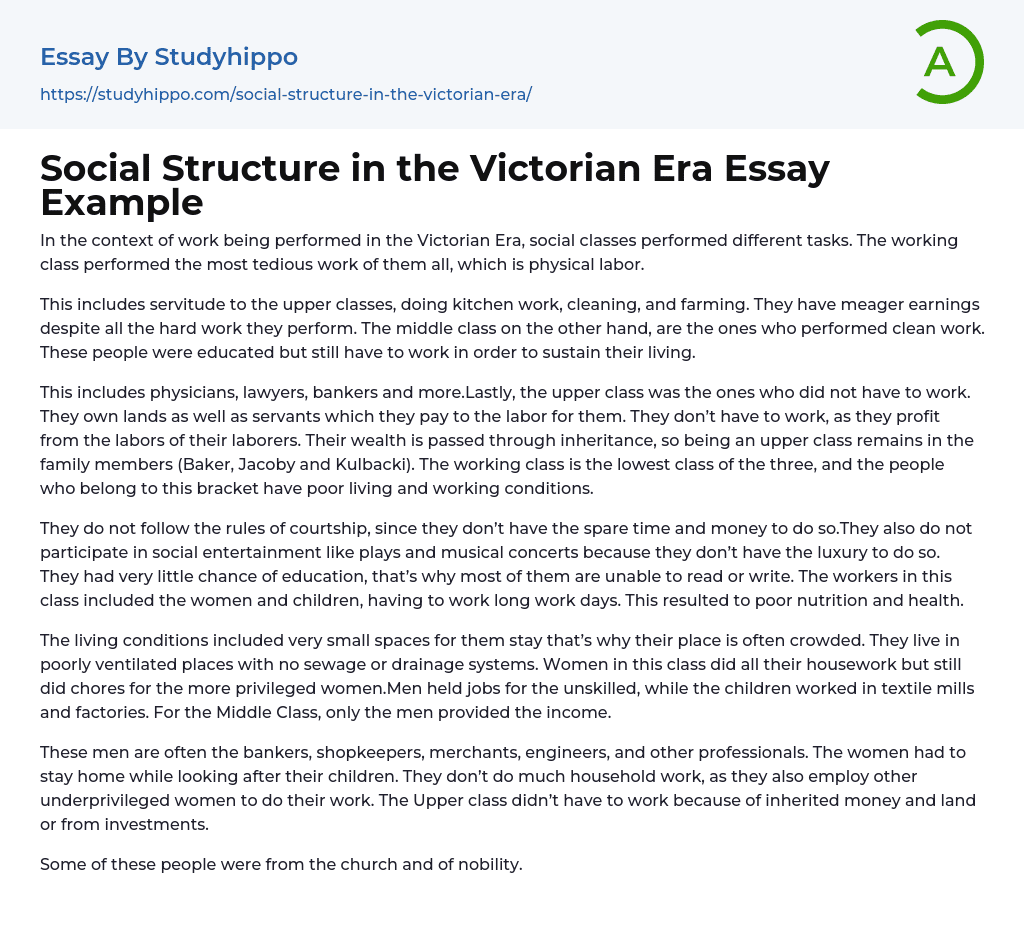In the context of work being performed in the Victorian Era, social classes performed different tasks. The working class performed the most tedious work of them all, which is physical labor.
This includes servitude to the upper classes, doing kitchen work, cleaning, and farming. They have meager earnings despite all the hard work they perform. The middle class on the other hand, are the ones who performed clean work. These people were educated but still have to work in order to sustain their living.
This includes physicians, lawyers, bankers and more.Lastly, the upper class was the ones who did not have to work. They own lands as well as servants which they pay to the labor for them. They don’t have to work, as they profit from the labors of their laborers. Their wealth is passed throug
...h inheritance, so being an upper class remains in the family members (Baker, Jacoby and Kulbacki). The working class is the lowest class of the three, and the people who belong to this bracket have poor living and working conditions.
They do not follow the rules of courtship, since they don’t have the spare time and money to do so.They also do not participate in social entertainment like plays and musical concerts because they don’t have the luxury to do so. They had very little chance of education, that’s why most of them are unable to read or write. The workers in this class included the women and children, having to work long work days. This resulted to poor nutrition and health.
The living conditions included very small spaces for them stay that’s why their place is often crowded
They live in poorly ventilated places with no sewage or drainage systems. Women in this class did all their housework but still did chores for the more privileged women.Men held jobs for the unskilled, while the children worked in textile mills and factories. For the Middle Class, only the men provided the income.
These men are often the bankers, shopkeepers, merchants, engineers, and other professionals. The women had to stay home while looking after their children. They don’t do much household work, as they also employ other underprivileged women to do their work. The Upper class didn’t have to work because of inherited money and land or from investments.
Some of these people were from the church and of nobility.
- Administration essays
- Architect essays
- Discipline essays
- Doctor essays
- Engineer essays
- Farmer essays
- Hunter essays
- Labor essays
- Model essays
- Nurse essays
- Pilot essays
- Police Officer essays
- Professionalism essays
- Social Work essays
- Stakeholders essays
- Teamwork essays
- Caste System essays
- Citizenship essays
- Civil Society essays
- Community essays
- Culture essays
- Deviance essays
- Discourse Community essays
- Female essays
- Filipino People essays
- Igbo People essays
- Indigenous Australians essays
- Indigenous Peoples essays
- Men essays
- Middle Class essays
- Minority Group essays
- Modern Society essays
- Popularity essays
- Social Control essays
- Social Institution essays
- Social Justice essays
- Social Norms essays
- Social Responsibility essays
- Socialization essays
- The nation essays
- Anthropology essays
- Audience essays
- Charity essays
- Cultural Competence essays
- Emile Durkheim essays
- Gender Roles essays
- Generation essays
- Globalization essays
- Interpersonal Relationship essays
- People essays




